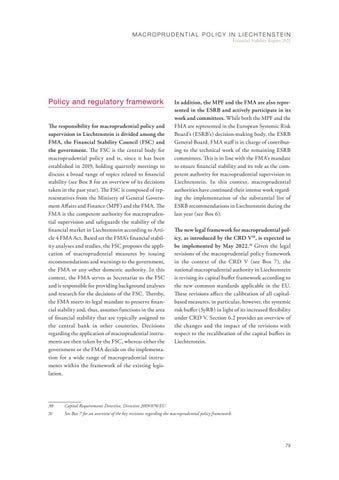M acroprudential policy in L iechtenstein Financial Stability Report 2021
Policy and regulatory framework The responsibility for macroprudential policy and supervision in Liechtenstein is divided among the FMA, the Financial Stability Council ( FSC ) and the government. The FSC is the central body for macroprudential policy and is, since it has been established in 2019, holding quarterly meetings to discuss a broad range of topics related to financial stability ( see Box 8 for an overview of its decisions taken in the past year ). The FSC is composed of representatives from the Ministry of General Government Affairs and Finance ( MPF ) and the FMA. The FMA is the competent authority for macroprudential supervision and safeguards the stability of the financial market in Liechtenstein according to Article 4 FMA Act. Based on the FMA’s financial stability analyses and studies, the FSC proposes the application of macroprudential measures by issuing recommendations and warnings to the government, the FMA or any other domestic authority. In this context, the FMA serves as Secretariat to the FSC and is responsible for providing background analyses and research for the decisions of the FSC. Thereby, the FMA meets its legal mandate to preserve financial stability and, thus, assumes functions in the area of financial stability that are typically assigned to the central bank in other countries. Decisions regarding the application of macroprudential instruments are then taken by the FSC, whereas either the government or the FMA decide on the implementation for a wide range of macroprudential instruments within the framework of the existing legis lation.
In addition, the MPF and the FMA are also represented in the ESRB and actively participate in its work and committees. While both the MPF and the FMA are represented in the European Systemic Risk Board’s ( E SRB’s ) decision-making body, the ESRB General Board, FMA staff is in charge of contributing to the technical work of the remaining ESRB committees. This is in line with the FMA’s mandate to ensure financial stability and its role as the competent authority for macroprudential supervision in Liechtenstein. In this context, macroprudential authorities have continued their intense work regarding the implementation of the substantial list of ESRB recommendations in Liechtenstein during the last year ( see Box 6 ). The new legal framework for macroprudential policy, as introduced by the CRD V30, is expected to be implemented by May 2022.31 Given the legal revisions of the macroprudential policy framework in the context of the CRD V ( see Box 7 ), the national macroprudential authority in Liechtenstein is revising its capital buffer framework according to the new common standards applicable in the EU. These revisions affect the calibration of all capitalbased measures, in particular, however, the systemic risk buffer ( SyRB ) in light of its increased flexibility under CRD V. Section 6.2 provides an overview of the changes and the impact of the revisions with respect to the recalibration of the capital buffers in Liechtenstein.
30
Capital Requirements Directive, Directive 2019 / 878 / EU.
31
See Box 7 for an overview of the key revisions regarding the macroprudential policy framework.
79


